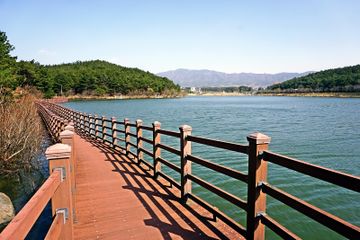영지
| 영지 Yeongji Pond |
|
 영지&영지석불좌상, 경주문화관광, 경주시청. |
|
| 대표명칭 | 영지 |
|---|---|
| 영문명칭 | Yeongji Pond |
| 한자 | 影池 |
| 주소 | 경상북도 경주시 외동읍 괘릉리 1261-1 |
|
|
|
해설문
국문
불국사 석가탑(釋迦塔, 국보 제21호)은 그림자가 비치지 않는 무영탑(無影塔)이라고도 한다. 영지는 무영탑 전설과 관련된 곳이다. 『동경잡기(東京雜記)』에는 불국사 뒷산의 나무와 단청이 비치지 않는 바가 없으므로 영제(影堤)라고 이름하였다고 하며, 조선 정조 때의 문인인 성대중(成大中)의 『청성잡기(靑城雜記)』에는 불국사 무영탑은 못에 그림자가 비치지 않는다며 경주의 7가지 괴이한 이야기[東都七怪] 중 하나로 기록하였다.
영지와 무영탑에 관한 최초의 기록은 1740년(영조 16)에 저술된 『불국사 고금창기(佛國寺古今創記)』이다. 당나라 석공과 그의 누이동생 아사녀의 이야기로 불국사 남서쪽 10리 지점의 못에 석가탑의 그리자가 비치지 않아 무영탑이라 했다는 간단한 기록이 있고, 초의선사의 ‘불국사 회고’라는 연작시에도 유사한 내용이 있다. 일제강점기 때 발간된 오사카긴타로(大板金太郞)와 오사카로쿠무라(大阪六村)의 『慶州の傳說(경주의 전설)』 중 ‘영지’에서 아사녀는 석공의 누이에서 아내로 바뀌었고, 탑 그림자가 영지에 비치지 않아 아사녀는 투신하고, 석공은 아내를 닮은 부처상을 조각한 후 투신한다는 비극적인 내용으로 변경되었다. 이를 토대로 현진건(玄鎭健)은 1941년 소설 『무영탑』에서 백제의 석공 아사달(阿斯怛)과 아내 아사녀(阿斯女)의 아름답고 슬픈 이야기를 완성하였다.
지금도 못 가에는 두 사람을 위해 지었다는 영사(影寺)의 돌부처가 남아 있으며, 영지 일대에는 두 사람의 사랑을 기리는 영지설화공원이 있다.
영문
Yeongji Pond
Yeongji Pond is a water reservoir located between two small mountains in Gwaereung-ri, Gyeongju. The name Yeongji means “Pond of Reflection.” It is unknown exactly when it was first built, but it is related to a legend about a stonemason named Asadal that takes place during the Unified Silla period (668-935).
When Bulguksa Temple was founded in the mid-8th century, all of the kingdom’s best artisans were called upon to participate in the construction. The skilled stonemason Asadal thus traveled to Gyeongju to help build the temple’s famous stone pagodas. However, the construction took a long time. After several years, Asadal’s wife, Asanyeo, could wait for him no longer, and so she went to Bulguksa Temple to see him. However, she was not allowed to meet him until the pagodas were completed. So, she went to a nearby pond where she waited for him. However, she missed him so much that she eventually threw herself into the pond and drowned.
There are several versions of this legend. An early version is found in a record about the construction of Bulguksa Temple that dates to 1740. In this version, Asadal was originally from Tang China and Asanyeo was his younger sister, not his wife. This version also states that Bulguksa Temple’s three-story stone pagoda could not be seen in the pond, so it came to be known as Muyeongtap, meaning the “Pagoda Without a Reflection.” In another version of the legend written by Japanese scholars during the colonial period (1910-1945), Asanyeo is introduced as Asadal’s wife. This version also adds that Asadal was so stricken with grief that he created a seated stone Buddhist statue in her likeness and enshrined it next to the pond, before also jumping into the pond to his death. And finally, in 1941, the novelist Hyeon Jin-geon (1900-1943) told the legend as we know it today in his novel Muyeongtap, adding that Asadal was from the former territory of the Baekje kingdom (18 BCE-660 CE).
영문 해설 내용
영지는 석공 아사달과 그의 아내 아사녀의 슬픈 전설과 관련된 연못이다.
751년 김대성이 불국사를 지을 때, 천하의 실력 있는 장인들을 모두 불러 모았다고 한다. 이름난 석공이었던 아사달도 불국사 창건에 동원되었으며, 다보탑과 석가탑을 만드는 데 전념하였다. 여러 해 남편이 돌아오기만을 손꼽아 기다리던 아사녀는, 그리움을 참지 못하고 불국사로 찾아갔으나, 탑이 완성될 때까지는 남편을 만날 수 없었다. 아사녀는 하는 수 없이, 근처에 있는 이 연못가로 와서 애타게 남편을 기다렸고, 결국 그리움에 지쳐 연못에 몸을 던지고 말았다.
아사달과 아사녀 이야기는 여러 버전이 있다. 원형으로 여겨지는 설화는 1740년 불국사의 사적을 기록한 『불국사 고금창기』에 실려 있다. 이 설화에서는 아사달을 당나라 석공으로, 아사녀를 그의 누이동생으로 기록하였고, 영지에 석가탑의 그림자가 비치지 않아 무영탑이라고도 부른다는 내용이 포함되어 있다. 일제강점기에 출간된 『경주의 전설』에서는 아사녀가 아사달의 아내로 바뀌었고, 아내의 죽음을 알게 된 아사달이 아내를 닮은 부처상을 조각한 후 연못에 투신한다는 내용으로 바뀌었다. 이 두 버전의 내용을 토대로, 소설가 현진건(1900-1943)은 1941년 『무영탑』이라는 소설을 통해 백제의 석공 아사달과 아내 아사녀의 아름답고 슬픈 이야기를 완성하였다.